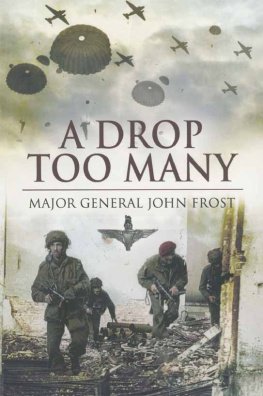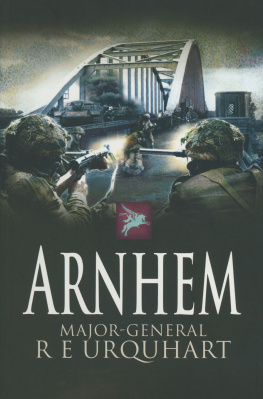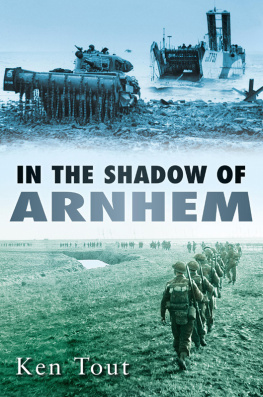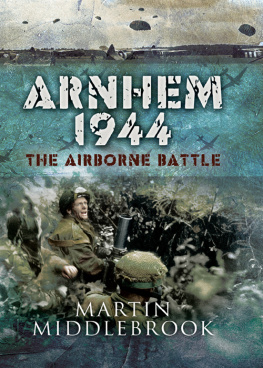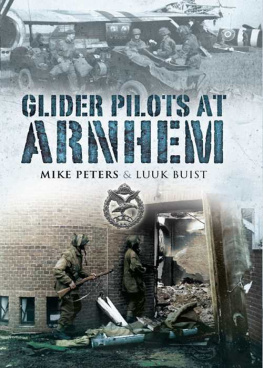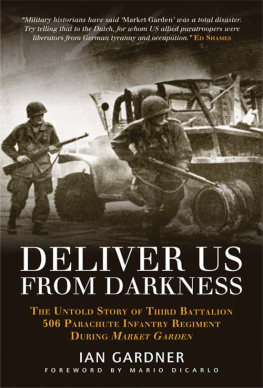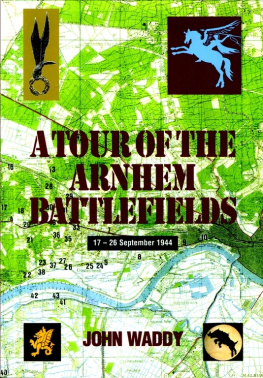A Drop Too Many
J OHN DUTTON FROST, son of Brigadier-General F. D. Frost of the Indian Army, was born in 1912. After a conventional education at Wellington and Sandhurst he was gazetted to the Cameronians (Scottish Rifles), with whom he served in England and Palestine, later being seconded to the Iraq Levies.
On return to the UK, he became one of the first parachutists and fought throughout the war with the 2nd Battalion of the Parachute Regiment. After the war he held a series of staff appointments until being made Commandant of the Support Weapons Wing of the School of Infantry. He then commanded the 44th Parachute Brigade TA before becoming GOC of the 52nd Lowland Division District. His last appointment was GOC Malta and Libya; while there he formed and commanded the Malta Land Force.
General Frost was awarded the Military Cross, the Distinguished Service Order and Bar, was a Companion of the Bath and a Grand Officer of the Sovereign Military Order of Malta. After retiring from the Army in 1968 he took up farming in West Sussex, where he reared beef cattle. He was also active in many aspects of local affairs. He died in 1993.
A DROP TOO
MANY
Major-General John Frost
CB, DSO, MC
First published in 1980 by Cassell Ltd
Republished in 1994 by Pen & Sword Books Ltd
and reprinted in 2002 and reprinted in this format in 2009 by
Pen & Sword Aviation
an imprint of
Pen & Sword Books Ltd
47 Church Street
Barnsley
South Yorkshire S70 2AS
Copyright 1994, 2002, 2009
the Executors of the late Major-General J. D. Frost
ISBN 978 1 84415 880 5
The right of the Executors of the late Major-General J. D. Frost
to be identified as authors of this work has been asserted by them
in accordance with the Copyright, Designs and Patents Act 1988
A CIP catalogue record for this book is
available from the British Library
All rights reserved. No part of this book may be reproduced or transmitted
in any form or by any means, electronic or mechanical including
photocopying, recording or by any information storage and retrieval
system, without permission from the Publisher in writing.
Printed and bound in Great Britain
by MPG Biddles Ltd
Pen & Sword Books Ltd incorporates the imprints of
Pen & Sword Aviation, Pen & Sword Maritime, Pen & Sword Military,
Wharncliffe Local History, Pen & Sword Select,
Pen & Sword Military Classics and Leo Cooper.
For a complete list of Pen & Sword titles please contact
PEN & SWORD BOOKS LIMITED
47 Church Street, Barnsley, South Yorkshire, S70 2AS, England
E-mail: enquiries@pen-and-sword.co.uk
Website: www.pen-and-sword.co.uk
To every man in the Second Battalion of the
Parachute Regiment:
past, present, and in the future
PARACHUTE BATTALION
Platoon by platoon in formation proudly,
Plane upon plane from the valleys mouth,
Piercing, with their black-winged squadrons
In powerful flight, the dark hill.
To the wild pipes bidding
Last night they danced reel and jig,
Glad for the light in each others eyes;
To the wild pipes bidding
They have sprung at the unknown shadows of the North
In what lowering mountain range
Will they make their stand and fight
And which strange-named stream shall be their bed,
Lying quietly together, strong in death?
To-day some silent valley of Tunisia
Shall tremble at their stroke from sky unsheathed,
And, with the night, perhaps some God looking down
With dull, cold eyes, by the near stars, will see
One lonely, grim battalion cut its way
Through agony and death to fames high crown,
And wonderingly watch the friendless strength
Of little men, who die that the great Truths shall live.
Richard Spender
Contents
Illustrations and Maps
following page 80
following page 176
Imperial War Museum photographs
Maps
| page |
| 5 |
| 45 |
| 69 |
| 81 |
| 89 |
| 119 |
| 131 |
| 157 |
| 175 |
| 213 |
| 215 |
I began to write this book while I was a prisoner-of-war and the memory of the battle of Arnhem was fresh in my mind. I kept the original draft under my bedclothes when we were visited by the Gestapo, so I feel that it must have some authentic value. I made several attempts to finish it, but so much intervened that I was discouraged from going further. However, since the publication of A Bridge Too Far by Cornelius Ryan, and the production of the film of the same title, I have been urged by so many people to tell my own story that I have now succumbed. With the active encouragement of my wife, Jeannie, I have written an account of my war service which will, I hope, interest and amuse people and yet provide some lessons for my peers and happy recollections for our old soldiers.
The story starts with my service with the Iraq Levies, when I commanded No. 2 Assyrian Company, a body of men whose watchword was Perfection. They set a standard which I have never seen exceeded. Whether they could have withstood the hard pounding that British troops habitually do I cannot say, but they were the direct descendants of the Assyrians of old whose cohorts were gleaming in purple and gold, and as such I shall always remember them.
After a short sojourn with my old regiment, the Cameronians (Scottish Rifles), always outstanding for dour, dogged slogging matches in every campaign and whose soldiers were as hardy and enduring as any in the world, I ventured into something quite new the Airborne Forces.
I hope that I have said enough in the following chapters to convey just what stuff the paratroops were made of. They were men of whom you could never ask too much. Wherever there was a Red Beret, there was a way.
Although some of the actions have been described before, especially Arnhem, Bruneval and Sicily, I am so glad to be able to narrate the part played by the 1st Parachute Brigade when, after completing their initial airborne operations in the Tunisian compaign, they remained to fight as infantry almost to the end. We were not meant to be so employed (indeed, Winston Churchill was adamant that we should not), but the generals on the spot were so hard-pressed that we had to be. The snag was that both the Prime Minister and the public at home had to be hoodwinked, and so the Press were debarred from our part of the front and all our fighting was attributed to other units and formations. We did not know of this at the time for we seldom saw newspapers from home, but it did hurt when letters from relatives implied that we must be having a nice easy life lying about under the Mediterranean sun. When one had been swopping punches with the German Parachute Regiment, Sturmregiment Koch, the Witzig Regiment and the 10th Panzer, one felt entitled to credit for having opposed crack German army units.
Much has been said and written about the battle of Arnhem, that great venture which could have changed the course of history had it been pursued with the vigour it deserved, but as I am so often asked: What went wrong at Arnhem? it is perhaps appropriate that I should take this opportunity of saying what I think.
The unwillingness of the air forces to fly more than one sortie in the day was one of the chief factors that militated against success. The transport aircraft could have been loaded before dawn on D-day, taken off at dawn, completed their mission and returned in time to have embarked their second lifts by noon. This would have allowed the bulk of the first lifts to make straight for the main objectives and dispensed with the time-consuming commitment to secure the D.Z.s for lifts on following days, when the weather might, and did, cause further delay.
Next page
